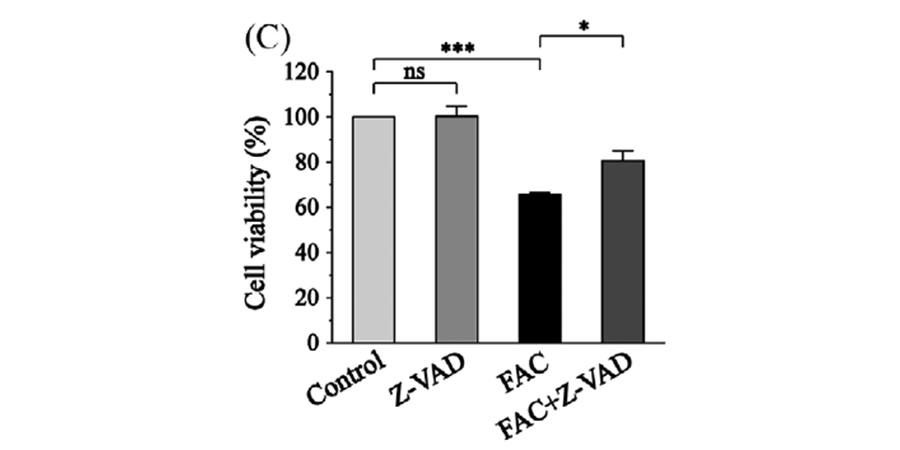Z-VAD(OH)-FMK (Synonyms: Z-Val-Ala-Asp-(OH)-Fluoromethyl Ketone) |
| Katalog-Nr.GC45189 |
Z-VAD(OH)-FMK is an irreversible tripeptide inhibitor of all caspases.
Products are for research use only. Not for human use. We do not sell to patients.

Cas No.: 161401-82-7
Sample solution is provided at 25 µL, 10mM.
Z-VAD(OH)-FMK is an irreversible tripeptide inhibitor of all caspases[1]. Z-VAD(OH)-FMK is the unmethylated form of Z-VAD-FMK. Z-VAD(OH)-FMK inhibits the apoptosis process by covalently binding to the active site of caspase and preventing its activation, and can be used to study apoptosis-related immune responses [2].
In vitro, Z-VAD(OH)-FMK (50μM) treatment of Panc-1 and MIAPaca-2 cells for 1 hour effectively inhibited Rhein-induced cell death[3]. Z-VAD(OH)-FMK (0-100μM) treatment of T cells dose-dependently inhibited cell proliferation without blocking the processing of caspase-8 and caspase-3 proteins[4]. Z-VAD-FMK (40μM) treatment of HeLa cells for 30 minutes inhibited TSSLT-induced apoptosis[5].
In vivo, Z-VAD(OH)-FMK (3mg/kg) can inhibit caspase activation and prevent myocardial contractile dysfunction and cardiomyocyte apoptosis through intravenous injection in rats with endotoxin injury[6]. Z-VAD(OH)-FMK (1.5 mg/kg) was combined with carfilzomib to treat C26 adenocarcinoma cells inoculated mice, resulting in an increase in caspase-3 and BAX levels and a decrease in BCL-XL levels in the gastrocnemius muscle, regulating protein levels in the renin-angiotensin system[7].
References:
[1] Davies C W, Chaney J, Korbel G, et al. The co-crystal structure of ubiquitin carboxy-terminal hydrolase L1 (UCHL1) with a tripeptide fluoromethyl ketone (Z-VAE (OMe)-FMK)[J]. Bioorganic & medicinal chemistry letters, 2012, 22(12): 3900-3904.
[2] Rajah T, Chow S C. The inhibition of human T cell proliferation by the caspase inhibitor z-VAD-FMK is mediated through oxidative stress[J]. Toxicology and applied pharmacology, 2014, 278(2): 100-106.
[3] Liu Y, Shi C, He Z, et al. Inhibition of PI3K/AKT signaling via ROS regulation is involved in Rhein-induced apoptosis and enhancement of oxaliplatin sensitivity in pancreatic cancer cells[J]. International Journal of Biological Sciences, 2021, 17(2): 589.
[4] Lawrence C P, Chow S C. Suppression of human T cell proliferation by the caspase inhibitors, z-VAD-FMK and z-IETD-FMK is independent of their caspase inhibition properties[J]. Toxicology and applied pharmacology, 2012, 265(1): 103-112.
[5] Liu H R, Peng X D, He H B, et al. Antiproliferative activity of the total saponin of Solanum lyratum Thunb in Hela cells by inducing apoptosis[J]. Die Pharmazie-An International Journal of Pharmaceutical Sciences, 2008, 63(11): 836-842.
[6] NEVIÈRE R, FAUVEL H, CHOPIN C, et al. Caspase inhibition prevents cardiac dysfunction and heart apoptosis in a rat model of sepsis[J]. American journal of respiratory and critical care medicine, 2001, 163(1): 218-225.
[7] Wang Q, Li C, Peng X, et al. Combined treatment of carfilzomib and z-VAD-fmk inhibits skeletal proteolysis and apoptosis and ameliorates cancer cachexia[J]. Medical oncology, 2015, 32: 1-10.
Average Rating: 5 (Based on Reviews and 39 reference(s) in Google Scholar.)
GLPBIO products are for RESEARCH USE ONLY. Please make sure your review or question is research based.
Required fields are marked with *





